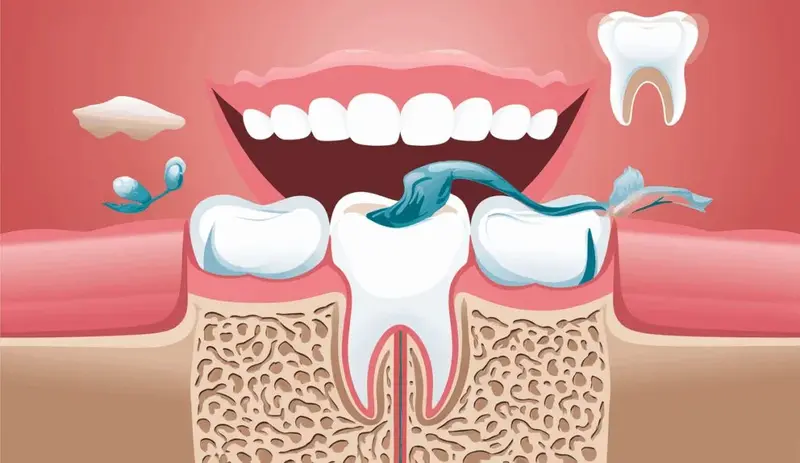
You’ve noticed something different about your gums lately. They seem to be pulling away from your teeth, creating small spaces that feel uncomfortable. These spaces, called tooth pockets, can be more than just a minor annoyance.
Dental health is complex, and understanding tooth pocket formation is crucial. Our team will break down the causes, risks, and prevention methods in a way that makes sense for everyday people.
Understanding Tooth Pockets: What You Need to Know
Imagine your gums are a soft seal that hugs each tooth. When the seal gets weak, the little valley beside the tooth gets deeper. We call that deeper space a “tooth pocket.” It can hide bad germs and hurt your mouth.
What Exactly Are Tooth Pockets?
A tooth pocket is just a gum-tooth line that has grown deeper than normal. Healthy gums sit 1-3 mm down from the tooth. The lining there sticks tightly to the tooth surface and keeps germs out.
When inflammation comes, that attachment loosens and the groove gets bigger. The spot becomes low-oxygen, perfect for nasty microbes. Dentists in Houston, TX use a thin metal probe to check depth. Anything 4 mm or more usually means serious gum disease.
Main Reasons Pockets Form
- Periodontal disease – Ongoing gum inflammation that turns into periodontitis is the biggest reason. It eats away the tissue and bone that hold the tooth.
- Not cleaning well enough – If plaque stays on the teeth it can harden into calculus. That rough stuff irritates gums and pushes the pocket open.
- Family genes – Some people have gene variants that make their immune system react oddly, so the tissue breaks down faster.
- Other health problems – Uncontrolled diabetes, certain autoimmune illnesses, or medicines that make gums grow too much can all upset the gum-tooth balance.
Things That Raise the Risk
- Smoking – Nicotine cuts blood flow, slows healing, and helps deep pockets grow.
- Diabetes – High sugar in the blood hurts white blood cells and adds more inflammation.
- Weak immune system – HIV, some cancers, or drugs that suppress immunity let germs run unchecked.
- Hormone changes – Pregnancy, puberty or menopause mess with gum blood vessels, making them more vulnerable.
- Family history – If close relatives had gum disease, you probably will too.
How Bacteria Help Pockets Grow
Plaque is a thick film full of bacteria like Porphyromonas gingivalis, Treponema denticola and Tannerella forsythia. When plaque hardens into tartar, brushing can’t reach it.
Those bugs make toxins that eat away collagen and bone. The deeper the pocket, the less oxygen there is, and that helps the more aggressive, protein-eating bacteria thrive. It becomes a cycle more bugs, more tissue loss, a deeper pocket, even more bugs.
You May Like To Read: Can Certain Foods Cause Gum Inflammation?
Ways to Prevent and Treat
The main goal is to break the plaque-bacteria loop and let gum tissue re-attach. At LifeWorks Dental, we specialize in comprehensive gum care that helps prevent these issues.
Basic Prevention Tips
- See the dentist regularly. Cleanings every six months are the strongest shield they knock out tartar under the gum line that you can’t get at home.
- Brush twice a day. Use a soft brush, angle it about 45° toward the gums, and move with short gentle strokes.
- Floss or use tiny brushes. These get rid of the film between teeth where a brush never reaches.
- Cut back on cigarettes. If you smoke, try to quit or at least lower usage.
- Keep other illnesses in check. Manage diabetes, follow doctor advice, stay hydrated.
- Eat less sugar. A diet low in refined carbs leaves less food for the harmful germs.
If a pocket already exists, a deep cleaning called scaling and root planing smooths the root surface. This helps gums lock back onto the tooth. In worse cases, dentists may add local antibiotics, a laser, or even surgery to restore the area.
When to Call the Dentist
- Bleeding that won’t stop when you brush or floss.
- Swollen, sore gums.
- Bad breath that stays despite good brushing.
- Teeth that feel loose or start to drift apart.
If any of these happen, make an appointment quickly. Our office near Google Maps can help you address these concerns promptly.
Conclusion
Tooth pockets are not a normal part of getting older. They happen because gums lose their tight seal, mainly due to bad cleaning, disease or other health issues. By keeping your mouth clean, visiting the dentist often, and handling health risks, you can keep your gums strong and stop pockets from forming.
Tooth pockets might seem scary, but they’re manageable with proper care. Regular dental check-ups, good oral hygiene, and early intervention are key to maintaining a healthy smile





